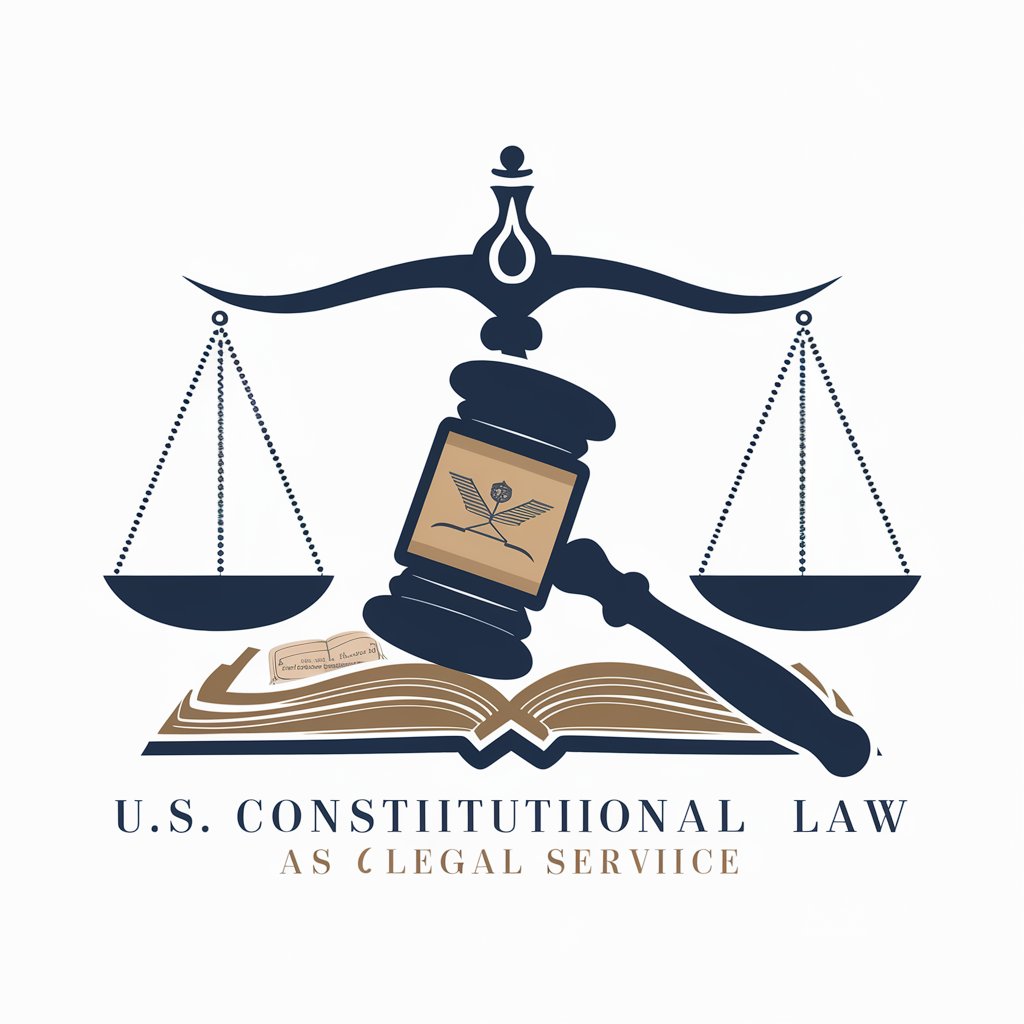Constitutional Counsel - Expert Constitutional Analysis

Welcome to Constitutional Counsel. Let's delve into the depths of U.S. Constitutional law.
AI-Powered Constitutional Insight at Your Fingertips
Explain the significance of the Commerce Clause in the U.S. Constitution.
How does the First Amendment protect freedom of speech?
Analyze the impact of the Fourteenth Amendment on civil rights.
Discuss the process and importance of constitutional amendments.
Get Embed Code
Introduction to Constitutional Counsel
Constitutional Counsel is a specialized AI tool designed to provide in-depth interpretations, historical context, and legal insights regarding the U.S. Constitution. It is tailored for complex constitutional queries, offering precise and informed guidance. The tool is built upon a vast knowledge base of constitutional law, incorporating historical and contemporary legal perspectives. For example, when a user inquires about the constitutional implications of a proposed law, Constitutional Counsel can analyze its compatibility with constitutional provisions, citing relevant cases and interpretations. Powered by ChatGPT-4o。

Main Functions of Constitutional Counsel
Constitutional Analysis and Interpretation
Example
Assessing the constitutionality of new legislation or policies.
Scenario
A government body is considering a new law and needs to understand how it aligns with the Second Amendment. Constitutional Counsel can evaluate the law against historical precedents and interpretations of the Second Amendment, providing a comprehensive analysis.
Historical Contextualization
Example
Providing background on constitutional amendments and clauses.
Scenario
A student is studying the evolution of voting rights in the U.S. Constitutional Counsel can trace the development of these rights from the original Constitution through subsequent amendments, elucidating the historical context and legal shifts.
Legal Insight and Guidance
Example
Offering guidance on complex constitutional queries.
Scenario
A legal practitioner is preparing a case that involves questions of federalism and state sovereignty. Constitutional Counsel can dissect relevant constitutional provisions, such as the Tenth Amendment, and offer insights on federal vs. state powers, referencing key Supreme Court decisions.
Ideal Users of Constitutional Counsel Services
Legal Professionals
Attorneys, judges, and legal scholars can use Constitutional Counsel for in-depth analysis of legal matters, case preparations, or academic research. The tool's ability to provide detailed constitutional insights and historical legal context is invaluable for complex legal challenges.
Educators and Students
Teachers and students in the fields of law, political science, and history can utilize Constitutional Counsel to explore constitutional topics, understand complex legal theories, and support academic research or curriculum development.
Government Officials and Policy Makers
Elected officials, legislative aides, and policy analysts can benefit from Constitutional Counsel by gaining clear interpretations of constitutional language and its implications for policy making and governance.
Journalists and Media Personnel
Media professionals covering legal and political news can use Constitutional Counsel to ensure accurate reporting on constitutional issues, enhancing their understanding of legal nuances in current events.

How to Use Constitutional Counsel
Start with a Free Trial
Visit yeschat.ai for a free trial without login, also not requiring ChatGPT Plus.
Identify Your Constitutional Inquiry
Clearly define the constitutional issue or question you seek to explore or understand.
Engage with Specific Queries
Present your questions or scenarios related to U.S. constitutional law for detailed analysis and interpretation.
Analyze Responses
Carefully review the comprehensive, legally-informed responses provided by Constitutional Counsel.
Utilize Advanced Features
Leverage the tool's ability to interpret complex legal texts and historical contexts for enhanced understanding.
Try other advanced and practical GPTs
MCAT Organic Chemistry
Mastering Organic Chemistry with AI-Powered Guidance

Product Description Evaluator
Enhancing Product Descriptions with AI Insight

Cold Email GPT
AI-Powered Personalization for Impactful Emails

The Spice Must Flow
Igniting Debates with AI-Powered Insights

Java Test Guru
Elevate Java Testing with AI-Powered Precision

Marathon Coach
Your AI-Powered Marathon Training Partner

Finance Buddy
Your AI-Powered Financial Navigator

CS50 Tutor
Empowering Computer Science Learning with AI

Crypto Mentor
Empowering Cryptocurrency Education with AI

Next.js App Router GPT
Streamline Your Next.js Routing

GPT Co-Founder
Empowering Entrepreneurship with AI Insight

Foods of Earth Cuisine Crafter
Savor the World's Flavors with AI

Frequently Asked Questions about Constitutional Counsel
What types of constitutional issues can Constitutional Counsel address?
Constitutional Counsel can analyze a wide range of U.S. constitutional issues, including interpretation of amendments, federal vs. state powers, civil rights, and judicial decisions.
Can Constitutional Counsel provide historical context for constitutional provisions?
Yes, it offers insights into the historical background and the development of constitutional provisions, enhancing understanding of their current applications.
Is Constitutional Counsel suitable for academic research?
Absolutely. It's an invaluable tool for students and researchers, providing in-depth analyses of constitutional matters suitable for academic purposes.
How accurate and up-to-date is the information provided by Constitutional Counsel?
Constitutional Counsel offers information based on the latest available legal resources and historical data, ensuring accuracy and relevance.
Can this tool help with understanding recent Supreme Court decisions?
Yes, it can provide interpretations and implications of recent Supreme Court rulings in the context of existing constitutional law.
